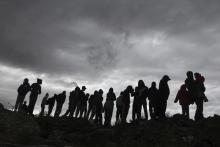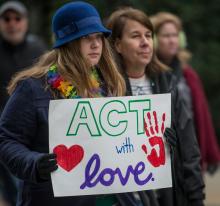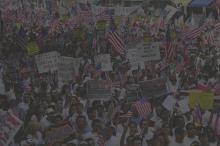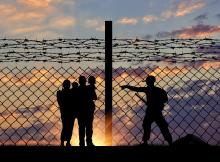It’s one of the most intriguing sub-plots of the 2016 election: Why are evangelicals, who historically have supported immigration reform and a path to citizenship for deeply felt religious and moral reasons, gravitating towards the two candidates who are most hostile to policy changes that would accommodate and integrate undocumented immigrants into American life?
Immigration

Pope Francis will visit a prison and celebrate Mass in Ciudad Juarez, the Mexican border city plagued by violence in recent years, the Vatican has said in an announcement of details of the pontiff’s upcoming visit to Mexico.
The pope’s visit to Ciudad Juarez will conclude his six-day Mexico tour, starting on Feb. 12. The stop will draw attention to drug-related violence and the U.S. policy on migration.
While in the city on Feb. 17, Francis will tour a prison, meet with workers, and celebrate Mass at the fairgrounds close to the border. Around 220,000 people are expected to attend the Mass, with tickets offered to parishes on both sides of the Mexico-U.S. border.

Since the Republican presidential front-runner announced after San Bernardino that he would close America’s borders to Muslims, a debate has ensued about what “radicalization” means and how far we as a nation are willing to go to protect ourselves from it. So-called liberals (and even some in the Republican party’s mainstream) have said, “Not all Muslims have been radicalized.” To this Donald Trump retorts, “Until we know which ones have been, let’s keep them all out.” The unquestioned consensus in America’s public square is that we can only be safe by figuring out who the un-American terrorists are and getting rid of them.
But where we're from in North Carolina, we should not be so naïve. We have a disproportionate share of homegrown terrorists.

Not since the World War II have United States politicians exercised such an extreme level of xenophobia, nationalism, and unapologetic bent toward fascism. Trump is calling Americans to break faith with our own constitution, which guarantees the protection of all faith traditions within our borders. This is not only un-American: It is ungodly. All humanity, regardless of religious affiliation, is made in the image of God. As such every human being is worthy of respect, dignity, and equal protection of the law. To scapegoat Muslim people is to scapegoat the image of God on earth.
There is a real threat, but it does not come from Islam. It comes from a relatively small band of misguided extremists who are leveraging our fear in order to destroy us — from within.

There are many reasons to recommend Brooklyn — its relatable story for one, its glowing visuals and performances for another. But Brooklyn’s commendable qualities go far beyond this, including the amount of respect writer Nick Hornby and director John Crowley give the movie’s female protagonist. Brooklyn is a movie about hard choices, and for the most part, Eilis makes those choices on her own. At different points in the film, she’s caught between romantic relationships, and familial and personal obligations. But in none of these situations does it feel like her hand is forced. The movie lets us know early that Eilis can take care of herself, and she’s never forced to compromise on that point, though she easily could have been.
Although politics aren’t really on Brooklyn’s agenda, the film also carries an unintentional point on that score worth considering. At a time when the United States is anxious about welcoming refugees and immigrants, this film reminds us that our country is made up largely of immigrants — some who look like Eilis, but also many who don’t.

God’s been telling the story of restoration since Genesis when we were created selem Elohim, in the image of God. We were created into perfect communion with God. From Genesis 3 until the end of the Old Testament, we see a narrative of a people in exile and God giving opportunities for reconciliation and restoration of relationship that humanity is incapable of accepting. Reconciliation is an exchange of something worthless (our condition of sin) for something immeasurably worthy (communion with God).
In the New Testament we see a biblical narrative through Jesus of now-but-not-yet restoration. In Jesus we see the coming of the Kingdom of God and get to be reconciled back to God. We even get a glimpse of an eternity where there is no more death or mourning or crying or pain.
If we truly believe we are the image of God, it changes how we approach the image of God in the world. Our call then is to actively partner with God in taking the world somewhere.

The U.S. Fifth Circuit Court of Appeals ruled on Nov. 9 against the Obama administration’s attempt to protect undocumented immigrants from deportation.
President Obama created the Deferred Action for Parents of Americans (DAPA) and expanded the Deferred Action for Childhood Arrivals (DACA) programs by executive action in 2014.

Jim Wallis has denounced a recent federal court decision that prevents, for now, the implementation of President Barack Obama's immigration reform agenda.
A three judge panel of the Fifth Circuit Court of Appeals ruled 2-1 on Monday against a federal program that would have granted an estimated 5 million undocumented immigrants legal status.
Wallis, who is the founder and president of the Evangelical social justice group Sojourners, said in a statement Tuesday that the panel majority "put politics over people."

The U.S. Fifth Circuit Court of Appeals ruled on Nov. 9 against the Obama administration’s attempt to protect undocumented immigrants from deportation.
President Obama created the Deferred Action for Parents of Americans (DAPA) and expanded the Deferred Action for Childhood Arrivals (DACA) programs by executive action in 2014.
Sojourners has long been in favor of comprehensive immigration reform, and opposes the Fifth Circuit’s decision. Sojourners founder and president Jim Wallis released the following statement on the ruling.

FOR IMMEDIATE RELEASE
Contact: Michael Mershon, Director of Advocacy and Communications
Email: mmershon@sojo.net
Phone: 202-745-4654

FOR IMMEDIATE RELEASE
Contact: Michael Mershon, Director of Advocacy and Communications
Email: mmershon@sojo.net
Phone: 202-745-4654

On their first day in office, newly elected members of the U.S. House of Representatives take an oath on the House floor — to “support and defend the Constitution of the United States.”
But before his election as Speaker of the House, Rep. Paul Ryan took another oath — this time to the so-called “Freedom Caucus,” a group of several dozen overwhelmingly white, conservative Congressmen from overwhelmingly white, conservative congressional districts.
Specifically, reports the National Review, the oath “extracts Ryan’s word that he will not bring up comprehensive immigration reform ‘so long as Barack Obama is president’ and, as speaker, even in the future, Ryan will not allow any immigration bill to reach the floor for a vote unless a ‘majority’ of GOP members support it.”
In short, in order to become the new speaker of the House, Ryan has vowed to block immigration reform from coming to a vote until January 2017 — at the earliest.
This is the second time Ryan has made a pledge on immigration reform. I remember the first: in 2014, Ryan called me at the Sojourners office, offering to help Christians pass comprehensive immigration reform. That led to meetings in Ryan’s office with key evangelical leaders about how to do that strategically, with Ryan telling us that the “evangelical factor” on immigration reform was something he had never seen before.
He promised us on several occasions that he would help bring immigration reform bills to the floor of the House. Many other Republicans promised the same thing to evangelical pastors who came to visit them from their districts.

A Honduran cardinal who is a top adviser to Pope Francis said he expects the pontiff to travel to Mexico’s border with the U.S. when he visits that country in February.
“I think it’s almost sure he will go to the border. I don’t know which cities,” said Cardinal Oscar Rodriguez Maradiaga, who heads a special council of nine cardinals that Francis set up in 2013 to advise him on reforming the Vatican.
“Knowing him, he will go … I don’t know yet where,” Rodriguez said in an interview on Nov. 3 before taking part in a Fordham University panel on “Laudato Si’,” the pope’s groundbreaking encyclical on the moral duty to protect the environment.

THE FAMILIES arriving at the Sacred Heart Humanitarian Respite Center in McAllen, Texas, all come with one thing in common—a high sense of hope and faith in God. Much like the Holy Family, these families were forced to flee because they feared for the lives of their children.
Catholic Charities of the Rio Grande Valley began a humanitarian crisis-relief program in the summer of 2014 to respond to the influx of immigrants crossing the border who didn’t have a place to rest. Many are fleeing the violence in Central America. In El Salvador, for example, the murder rate has more than doubled since 2012 and soon will pass that of Honduras, which has the highest murder rate per capita in the world.
With the help of Sacred Heart Catholic Church and hundreds of volunteers, we were able to open a place of safety for refugees before they continue on their journey. For these holy families, it is the love for their children that moves them to face all possible dangers by traveling north.
In the biblical story, St. Joseph was a “just man” and faithful. He was forewarned of Herod’s imperial violence and fled the country to protect his wife and infant son. At our center the fathers are also men of profound dedication and attentiveness to the needs of their families.
One young dad had left his home in Central America with his pregnant wife and their two little girls. His wife gave birth in Mexico. As they prepared to cross the Rio Grande into the U.S., he and the baby became separated from his wife and two daughters. He lost them. When he and the 1-month-old baby arrived at our center, he had no idea if his wife and two little girls were alive or if he would ever see them again.

The first thing the new Pope Francis said to the world in St. Peter's Square when he accepted the papacy was "I am a sinner." In a final mass of one million people in Philadelphia, the last words Francis spoke to the American people were, "Please pray for me; don't forget!"
1. 9 Ways We Can Make Social Justice Movements Less Elitist and More Accessible
"After a few weeks of feeling confused and invisible, I decided that I just wasn't smart enough to be an activist."
2. WATCH: Obama Condemns 'Routine' of Mass Shootings, Says U.S. Has Become Numb
"As I said just a few months ago, and I said a few months before that, and I said each time we see one of these mass shootings, our thoughts and prayers are not enough."
3. French Catholics Take in Refugee Family Seeking a 'Normal Life'
"The local effort is part of a national Catholic network that connects homeless asylum seekers with families willing to take them in."

This short documentary profiles 100 women who marched 100 miles to Washington, D.C., to call for comprehensive immigration reform. Inspired by the message of Pope Francis, these women believe immigration is a women's issue.

Stunning is the word that most comes to me after Pope Francis' two-day visit to Washington, D.C. The country and the media was reveling in his presence, using language like "amazing," "incredible," and "wonderful" in response to this extraordinary moral leader who literally transformed our public discourse in the 48 hours he was in the nation's capital. What these two extraordinary days mean going forward is the big question on all our hearts and minds.

Next week, the conversation will change in America. All the media attention recently given to political figures will now shift to a moral leader who is changing the global public discussion about what is compassionate, just, good, and right -- and Christian.